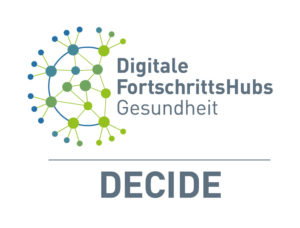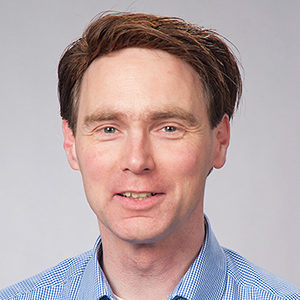DECIDE (Decentralized digital Environment for Consultation, data Integration, Decision making and patient Empowerment): Improve quality of care in rural areas
About the project

The disparity in medical care between urban and rural areas has been a growing problem in Germany for some time. There are regular reports about the closing or merging of municipal hospitals or the difficulty in finding successors for rural medical practices. In this context, DECIDE was entrusted with the task of balancing out these disparities in the quality of care with forward-looking IT solutions.
In order to be able to treat the widespread diseases cancer and mental illnesses at the highest level even in structurally weaker regions, various tools are being developed by DECIDE to ensure the provision of care and to make data available for research.
Use Cases
Oncology: lung and colorectal cancer
One of the declared goals of DECIDE is the development of a telemedical infrastructure. To this end, the University Medical Center Mainz offers consulting services for regional hospitals and medical practices as well as their patients and can thus ensure a high quality of rural care. In one of three case studies
Modern cancer therapy often requires specialized diagnostics from the university hospital – such as the analysis of genetic tumor data; this enables personalized therapy decisions to be made locally. To this end, DECIDE is also working to further develop a system that can support medical decisions using artificial intelligence. Where possible, people with cancer will also be given the option to participate in clinical trials at the university hospital, giving them access to the latest treatment options.
Psychiatry: depression
Depression is a common disease, in many cases recurrent or chronic, that often occurs together with other mental and somatic medical conditions. Such comorbidities place high demands on therapy concepts and make close coordination between inpatient and outpatient care particularly important. The interdisciplinary exchange of therapy data has been hampered by the fact that handwritten and textual records have played a much greater role in psychiatry and psychotherapy than in other areas of medicine. This makes it all the more important to establish the digitization of clinical data and improve communication structures among the players involved. To promote this and make specialist expertise from university medicine available in regional care, DECIDE will digitize standardized clinical data and use its telemedicine infrastructure.
To better track treatment progress, the telemonitoring system will also regularly ask outpatients about their health status. At the same time, patients can benefit from “wearables” – wearable sensors on the wrist that record treatment-related health data. Feedback and data from patients are stored in an electronic record that treating physicians can use to better tailor treatment plans for each individual. On the other hand, patient data is transmitted to the Data Integration Center at Mainz University Medical Center. There, they are anonymized and can be used by health research to further optimize treatments for depression.
Sports medicine
Physical activity is an important adjunctive therapy for many cancer patients, for example to reduce the side effects of chemotherapy such as fatigue or muscle weakness. An exercise program can also counteract the depressive episodes that often accompany cancer. Because these opportunities are often lacking in rural areas, DECIDE aims to develop personalized exercise services that can be streamed to patients’ smartphones and delivered in a home setting. The therapist can monitor the workout with sensors on the wrist or feedback via the mobile app.
Management of the Digital Progress Hub

Dr. Torsten Panholzer
Leiter des Digitalen FortschrittsHubs DECIDE
Abteilung Medizinische Informatik | Universitätsmedizin der Johannes Gutenberg-Universität Mainz
- Universitätsmedizin Mainz
- Universitäres Zentrum für Tumorerkrankungen
- Universitätsmedizin Mainz
- Klinik für Psychiatrie und Psychotherapie
- Johannes Gutenberg-Universität Mainz Institut für Sportwissenschaft
- Fraunhofer-Institut für Techno- und Wirtschaftsmathematik (ITWM), Kaiserslautern
- MCS Data Labs GmbH, Berlin
- Krankenhaus der Barmherzigen Brüder Trier
- Deutsche Stiftung für junge Erwachsene mit Krebs
- Selbsthilfe Stoma Welt e.V.
- Krebsgesellschaft Rheinland-Pfalz e.V.
- Krebsregister Rheinland-Pfalz gGmbH
- Rheinhessen-Fachklinik Alzey
- Helios HSK Wiesbaden
- Landesnetzwerk Selbsthilfe seelische Gesundheit Rheinland-Pfalz NetzG-RLP e.V.
- Tagesklinik für Psychiatrie und Psychotherapie, Mainz
- Praxis für Hämatologie und Onkologie Koblenz
In addition, DECIDE cooperates with other clinics and physicians in private practice not listed here
Project presentation MIRACUM Colloquium (Youtube)

